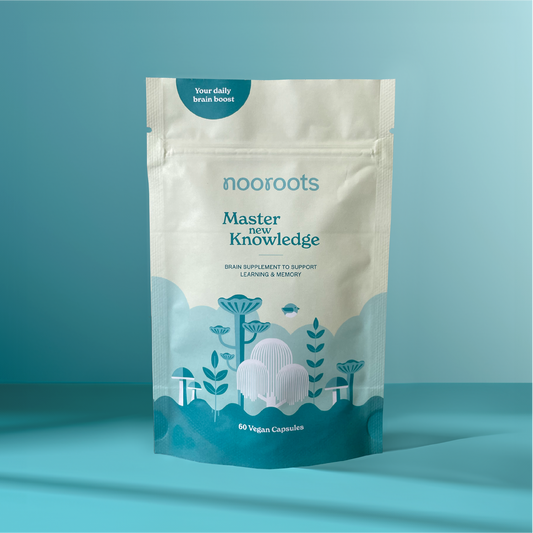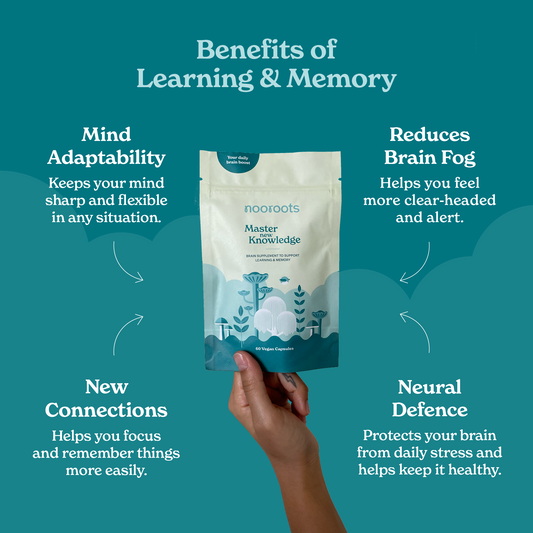Cocoa, derived from the seeds of Theobroma cacao, is not just the cornerstone of delightful chocolates but also a rich source of polyphenols, especially flavanols such as epicatechin and catechin. These natural compounds are not only beneficial for health but are increasingly being recognized for their nootropic effects, particularly in enhancing cognitive functions.
This review explores cocoa's impact as a natural nootropic on cognitive performance, focusing on young adults—a demographic often overlooked in cognitive research predominantly centered on aging populations.
Our exploration is anchored in the study "Effect of Cocoa and Cocoa Products on Cognitive Performance in Young Adults," led by researchers María Angeles Martín, Luis Goya, and Sonia de Pascual-Teresa, and published in November 2020. This systematic review compiles and analyzes multiple studies to unravel how the consumption of this natural nootropic could bolster cognitive processes and brain health among the younger cohort.
Ever wondered how a simple dietary choice could influence your brain function? Could cocoa, as a natural nootropic, be the key to optimizing your cognitive health? Let's find out.
Contents
- Background
- Study Overview
- Results
- Discussion
The Role of Cocoa in Cognitive Enhancement

Background
Historically, cocoa has been a cherished commodity, used extensively by ancient civilizations like the Aztecs and Mayans primarily as a beverage and for medicinal purposes.
Its purported health benefits have been recognized for centuries, often consumed for its stimulating and restorative properties. In modern times, cocoa continues to gain popularity, not just as a key ingredient in confections but also for its health implications in diet and wellness circles.
Its high polyphenol content is linked to various health benefits, including improved cardiovascular health and enhanced cognitive functions. These attributes make cocoa a subject of interest in nutritional research and a popular inclusion in health-conscious diets, particularly as a natural nootropic.
Study Overview
The study titled "Effect of Cocoa and Cocoa Products on Cognitive Performance in Young Adults" was authored by María Angeles Martín, Luis Goya, and Sonia de Pascual-Teresa, and published on November 30, 2020.
This systematic review aimed to consolidate and evaluate the existing evidence regarding the effects of both acute and chronic consumption of cocoa flavanols on cognitive functions and brain health specifically in young adults, highlighting its role as a natural nootropic.
Researchers meticulously selected studies through databases like Web of Science and PubMed, adhering to PRISMA guidelines, focusing on randomized controlled trials to ensure robust results.
The final analysis included 11 intervention studies encompassing a total of 366 participants, primarily children and young adults with an average age of 25 years or less.
The reviewed studies varied in their setup, examining both immediate (acute) and long-term (chronic) consumption of cocoa, with durations extending up to 30 days and employing various controls to compare cognitive enhancements in participants consuming flavanol-rich cocoa—understood as a natural nootropic—against those who did not.
Results
The systematic review unearthed compelling evidence that both acute and chronic intake of cocoa flavanols can significantly enhance cognitive functions in young adults, supporting their potential as a natural nootropic.
Key findings indicated improvements in memory, attention, and processing speed immediately following consumption, with prolonged intake associated with sustained cognitive enhancements.
- Increased Blood Oxygenation: Among 16 young women, consuming 172 mg of cocoa flavanols over five days significantly increased blood oxygenation levels in active brain regions, a marker of enhanced brain activity, measured through functional magnetic resonance imaging (fMRI).
- Enhanced Cerebral Blood Flow: In a group of young adults, acute intake of 516 mg of cocoa flavanols led to a substantial 60% increase in cerebral blood flow two hours post-consumption, illustrating the vasodilative effect of flavanols on cognitive functions.
- Improved Serial Subtraction Performance: Participants consuming 520 mg of cocoa flavanols showed notable improvements in performing serial subtraction tasks at all measured times, in contrast to those who consumed a higher dose of 994 mg and saw no improvement.
- Reduction in Inflammatory Mediators: In a chronic study, children consuming 680 mg of cocoa flavanols daily for about 10 days experienced a decrease in plasma endothelin-1 and inflammatory mediators, with 83% showing improvement in short memory tasks.
- Mental Fatigue and Performance Enhancement: Forty participants reported improvements in mental fatigue and enhanced performance on the Serial Sevens task after daily consumption of 250 mg of cocoa flavanols for 28 days.
Notably, these results were statistically significant, suggesting that cocoa flavanols play a beneficial role in brain health and cognitive performance, supported by increases in cerebral blood flow and neurotrophin levels which are crucial for brain plasticity and function.
Discussion
The study's findings that cocoa flavanols can enhance cognitive performance in young adults align with existing research emphasizing the neuroprotective effects of polyphenols.
These results are particularly promising as they suggest potential for early dietary interventions using cocoa as a natural nootropic to promote cognitive health. However, the study faces limitations, including the variation in cocoa flavanol dosages and the short duration of some trials, which might affect the generalizability of the findings.
Future research could focus on long-term cognitive outcomes and the mechanisms underlying the observed benefits.
From a practical standpoint, incorporating flavanol-rich cocoa into the diet could be a simple yet effective strategy to enhance cognitive vitality and prevent cognitive decline. For students, professionals, or any individuals interested in cognitive enhancement, regularly consuming cocoa products like dark chocolate or cocoa beverages might not only offer a delightful treat but also support brain health and performance as a natural nootropic. This dietary addition could be particularly beneficial during periods of high cognitive demand, such as exams or intensive work phases.
Conclusion
The findings from our review highlight the remarkable effects of cocoa flavanols on enhancing brain function.
Key outcomes include increased cerebral blood flow, improved performance in cognitive tasks, and reduced mental fatigue. These benefits suggest that incorporating cocoa flavanols into the diet could be a promising strategy for boosting cognitive health as a natural nootropic.
We encourage you to share your experiences with cocoa flavanols, share this post with friends, and perhaps try incorporating high-flavanol cocoa into your own diet to experience these benefits firsthand.
Learn more about the vitamins, minerals and natural nootropic plant extracts we use to give your brain a daily boost
- A Beginner's Guide to Ashwagandha
- A Beginner's Guide to Ginkgo Biloba
- A Beginner's Guide to Organic Cacao
- A Beginner's Guide to Holy Basil
- A Beginner's Guide to Rhodiola Rosea
- A Beginner's Guide to Guarana
- A Beginner's Guide to L-Theanine
- A Beginner's Guide to L-Tyrosine
- A Beginner's Guide to Piperine





